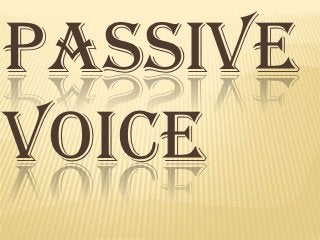
30202010 passive-voice 1
- 2. USE OF PASSIVE Passive voice is used when the focus is on the action. It is not important or not known, however, who or what is performing the action. Example: My bike was stolen. In the example above, the focus is on the fact that my bike was stolen. I do not know, however, who did it.
- 3. Sometimes a statement in passive is more polite than active voice, as the following example shows: Example: A mistake was made. In this case, I focus on the fact that a mistake was made, but I do not blame anyone (e.g. You have made a mistake.).
- 4. FORM OF PASSIVE Subject + finite form of to be + Past Participle (3rd column of irregular verbs) Example: A letter was written. When rewriting active sentences in passive voice, note the following:
- 5. The object of the active sentence becomes the subject of the passive sentence The finite form of the verb is changed (to be + past participle) The subject of the active sentence becomes the object of the passive sentence (or is dropped)
- 6. Tense Subject Verb Object Simple Active: Rita writes a letter. Present Passive: A letter is written by Rita. Simple Active: Rita wrote a letter. Past Passive: A letter was written by Rita. Present Active: Rita has written a letter. Perfect Passive: A letter has been written by Rita. Future I Active: Rita will write a letter. Passive: A letter will be written by Rita.
- 7. Subject Verb Object 1 Object 2 Active: Rita wrote a letter to me. Passive: A letter was written to me by Rita. Passive: I was written a letter by Rita.
- 9. PERSONAL PASSIVE Simply means that the object of the active sentence becomes the subject of the passive sentence. So every verb that needs an object (transitive verb) can form a personal passive. Example: They build houses. – Houses are built.
- 10. IMPERSONAL PASSIVE It is not as common in English as in some other languages (e.g. German, Latin). In English, Impersonal Passive is only possible with verbs of perception (e. g. say, think, know). Example: *They say that women live longer than men. *It is said that women live longer than men.
